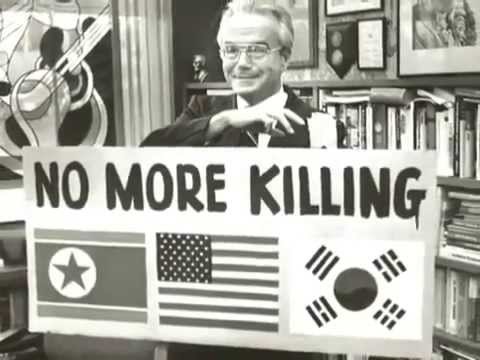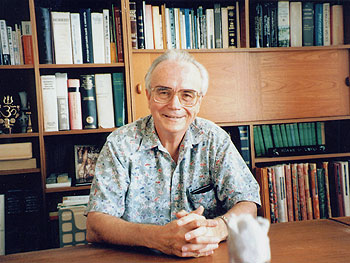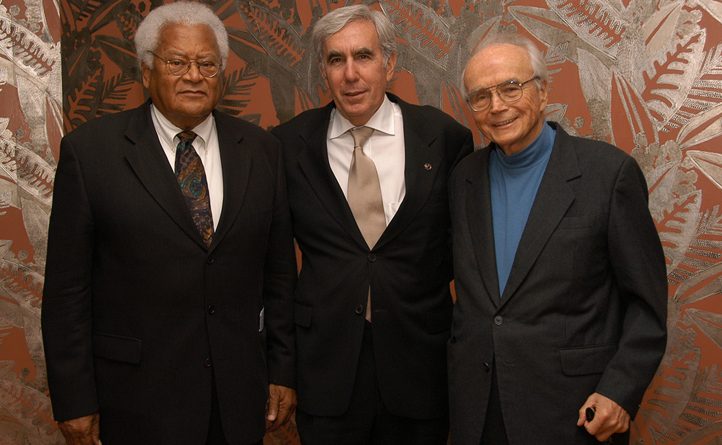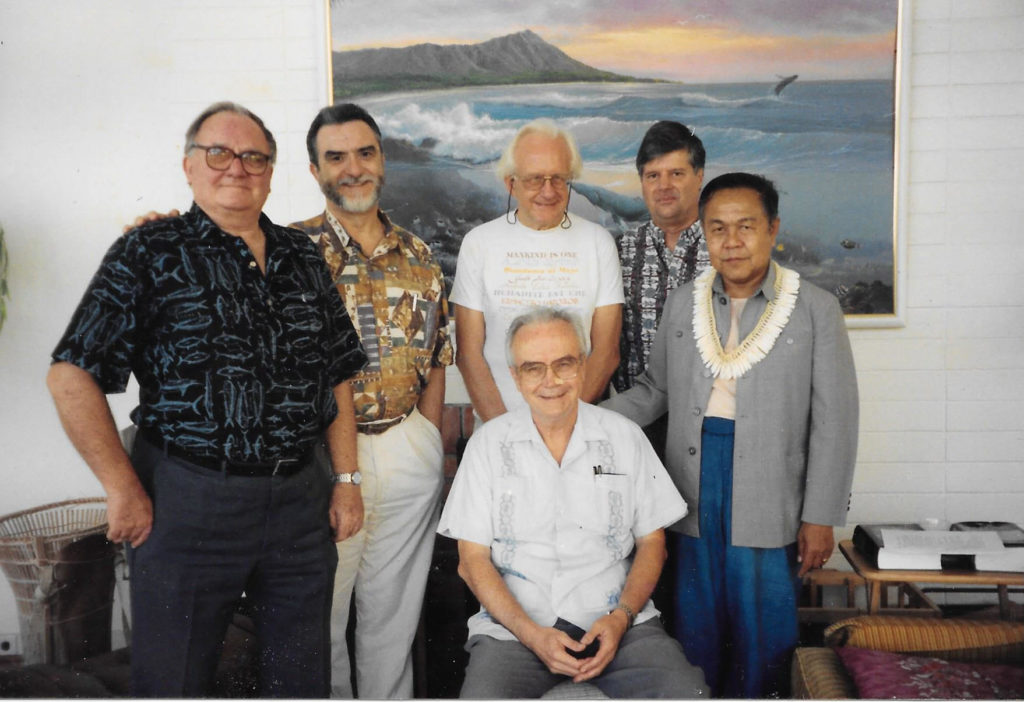Glenn Durland Paige (28 Jun 1929 – 22 Jan 2017): A Prophet of Nonkilling
BIOGRAPHIES, 27 Jun 2022
David Krieger | Center for Global Nonkilling – TRANSCEND Media Service
I wrote this in 2010, the year in which Glenn received the Nuclear Age Peace Foundation’s Distinguished Peace Leadership Award. It is about Glenn’s great transformation in life from a successful academic to a prophet of nonkilling. I’ve left the article in the present tense, and believe that Glenn lives on in the hearts and minds of the many people he inspired with his commitment to and leadership for a nonkilling world.
Glenn Paige is a man who in midlife re-created himself and his purpose on the planet. At the age of 44, he shifted from being an academic Cold Warrior to a man dedicated to nonkilling. He later described to me his transformation in this way: “It finally just came to me in three silent surprising words: ‘No More Killing!’ Technically it might be called the result of ‘cognitive dissonance’ when values and reality are perceived to clash. But it was nothing rational…and was definitely related to many years of study of Korea and involvement in relations with it, South and North. My book, The Korean Decision, justified war. The results finally sunk in to me – neither peace nor freedom.”
I asked Glenn to describe in a more detailed way what had happened when he experienced the words, “No More Killing.” He replied: “The words/idea ‘No More Killing’ specifically came in an instant from the Korean experience – and was simultaneously generalized to the whole world, not just war, but all forms of killing. The first thing I did was write a book review of my book on the Korean War…. Then I applied the same critique to the entire discipline of political science.” Now he is applying the same critique to the world.
I first knew of Glenn in the late-1960s. He came to the University of Hawaii in 1967 as a professor in the department of political science as I was finishing up my Ph.D. in the department. I would leave Hawaii in 1970, a few years before Glenn would experience his transformation in 1973. At the time, Glenn had the reputation for being a Cold Warrior, having served as a soldier in the Korean War and then writing a book in which he justified the US involvement in the war. I was strongly opposed to the Vietnam War, which was increasing in intensity and body counts at that time, and I had little tolerance for someone who had built his career on justifying any war. I was neither open-minded about war, nor tolerant of those who supported it. I felt that war was a way of misdirecting the lives of young people by propaganda and putting them in the untenable situation of having to kill or be killed. In that regard, I have changed my views very little over the years, but Glenn changed very much.
Glenn is a well educated Ivy Leaguer, who received a B.A. from Princeton and an M.A. from Harvard before being awarded a Ph.D. from Northwestern. He had carved out a place for himself in academia with his study of the political decision of US leaders to enter the Korean War. He had taught for six years at Princeton before accepting a position at the University of Hawaii. He didn’t seem like a strong candidate for transformation, but something mysterious happened, perhaps something latent in his character asserted itself with, as he described it, “three silent surprising words: ‘No More Killing!’”
Glenn transformed himself from an establishment academic who studied political leadership into a man who envisioned a peaceful, nonviolent world and was prepared to lead by example and personal commitment in attaining such a world. He publicly recanted the conclusions he had earlier reached and written in justification of the Korean War, and he went on to renounce killing and to establish a Center for Global Nonkilling.
How rare is that in academia? It is so rare as to have an impossibly small probability of occurring. Glenn’s initial path in academia was one that was bringing him considerable academic success. He had been well received by the foreign policy establishment in the United States, and his studies promised a comfortable academic career. However, his work prior to his transformation offered only the conventional “truths” that are deeply embedded in a culture of militarism. It justified one war, which helped build a foundation for the next one. It perpetuated the myth that wars are necessary and therefore glorious, the lies that induce new generations to submit to following orders and being willing to both kill others and sacrifice their own lives in war. His earlier work, in short, was consistent with adding academia as a third institutional leg to the Military-Industrial Complex that Eisenhower warned against.
Glenn’s transformation was so rare, in academia or any other profession, as to appear as a miracle, a change not easily explicable by reference to experience in our society. There are few modern day examples of such transformation. Glenn is walking in the path of champions of nonviolence like Thoreau, Tolstoy, Gandhi, Schweitzer and King. Like Nobel Peace Laureate Mairead Maguire, he is a prophet of nonkilling, which in my view goes even beyond nonviolence. It puts into tangible practice Schweitzer’s concept of reverence for life. It holds humanity to a higher standard. Glenn left the safety and comfort of the academic cloister to envision and help forge a better path for humanity.
In the future, I think people who seek a better world will look back with awe on Glenn’s life and transformation. I don’t mean to imply that Glenn is a saint. He is far too human and grounded for that. But I do mean to state strongly that he is a most honorable man who is deserving of great respect for his transformative shift of course and what he accomplished following that shift. Glenn became a leader in battling against our cultural acceptance of militarism with its all-to-easy reliance upon the use of force for domination and empire. Should we ever arrive at a day when nonkilling becomes our societal norm, Glenn will certainly be revered for his commitment, eloquence and leadership toward achieving this end.
Glenn once wrote me a humbling note: “I can only bow in reverence for the focused, successful mobilization of action for nuclear disarmament by the Nuclear Age Peace Foundation under your leadership. I believe it is the most effective nuclear disarmament movement in the world.” Of course, I was more than pleased to receive such a positive affirmation. In reflecting on Glenn’s words, I realize that making such affirmations is one of the tools of a good peace leader. Glenn is such a leader.
Glenn Paige has done the very best that one can do with his life. He has stood for truth and human decency. He has radically transformed himself from an academic proponent of conventional wisdom in a society dominated by militarism to become a powerful voice and force for compassion, decency, nonviolence and nonkilling. He has focused on nonkilling, a goal that to some may seem so distant as to be impossible. But to envision the impossible and to work to make it a reality is another important characteristic of a great peace leader.
Glenn has worked to bring the future we must achieve into the present. He gives me and, I’m sure many others, hope that a better world, a better future, is possible. He has demonstrated to other academics that the future is far more important than footnotes. He has lived the truths of peace and nonviolence that he discovered on his life journey, and he has shown by example that each of us can do more with our lives than may seem possible. In leading by example, he has shown a central trait of a strong peace leader.
Thank you, Glenn, for cutting away the tangled intellectual underbrush to forge a path toward a nonkilling political science and nonkilling societies. Thank you for envisioning and building an institution that will work toward these ends. Thank you for your compassionate and impassioned leadership aimed at achieving a world in which the killing of other human beings is taboo. Thank you for being you.
_______________________________________________
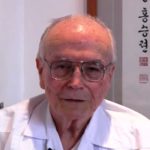 Glenn Durland Paige (28 Jun 1929 – 22 Jan 2017) was an American political scientist, member of the TRANSCEND Network for Peace, Development and Environment, Professor Emeritus of political science at the University of Hawai‘i, and Chair of the Governing Council of the Center for Global Nonkilling. Paige was known for developing the concept of nonkilling, his studies on political leadership, and the study of international politics from the decision-making perspective with a case study of President Harry S. Truman’s decision to involve the United States in the Korean War.
Glenn Durland Paige (28 Jun 1929 – 22 Jan 2017) was an American political scientist, member of the TRANSCEND Network for Peace, Development and Environment, Professor Emeritus of political science at the University of Hawai‘i, and Chair of the Governing Council of the Center for Global Nonkilling. Paige was known for developing the concept of nonkilling, his studies on political leadership, and the study of international politics from the decision-making perspective with a case study of President Harry S. Truman’s decision to involve the United States in the Korean War.
 David Krieger, Ph.D. is founder and president of the Nuclear Age Peace Foundation, and a member of the TRANSCEND Network for Peace Development Environment. Amongst several of his wide-spanning leadership endeavors in global peacebuilding, he is a founder and a member of the Global Council of Abolition 2000, councilor on the World Future Council, and is the chair of the Executive Committee of the International Network of Engineers and Scientists for Global Responsibility. He has a BA in Psychology and holds MA and Ph.D. degrees in Political Science from the University of Hawaii as well as a J.D. from the Santa Barbara College of Law; he served for 20 years as a judge pro tem for the Santa Barbara Municipal and Superior Courts. Dr. Krieger is the author of many books and studies of peace in the Nuclear Age. He has written or edited more than 20 books and hundreds of articles and book chapters. He is a recipient of several awards and honors, including the OMNI Center for Peace, Justice and Ecology Peace Writing Award for Poetry (2010). He has a new collection of poems entitled Wake Up. For more visit the Nuclear Age Peace Foundation website: www.wagingpeace.org.
David Krieger, Ph.D. is founder and president of the Nuclear Age Peace Foundation, and a member of the TRANSCEND Network for Peace Development Environment. Amongst several of his wide-spanning leadership endeavors in global peacebuilding, he is a founder and a member of the Global Council of Abolition 2000, councilor on the World Future Council, and is the chair of the Executive Committee of the International Network of Engineers and Scientists for Global Responsibility. He has a BA in Psychology and holds MA and Ph.D. degrees in Political Science from the University of Hawaii as well as a J.D. from the Santa Barbara College of Law; he served for 20 years as a judge pro tem for the Santa Barbara Municipal and Superior Courts. Dr. Krieger is the author of many books and studies of peace in the Nuclear Age. He has written or edited more than 20 books and hundreds of articles and book chapters. He is a recipient of several awards and honors, including the OMNI Center for Peace, Justice and Ecology Peace Writing Award for Poetry (2010). He has a new collection of poems entitled Wake Up. For more visit the Nuclear Age Peace Foundation website: www.wagingpeace.org.
Go to Original – nonkilling.org
Tags: Biography, Glenn D. Paige, Nonkilling
DISCLAIMER: The statements, views and opinions expressed in pieces republished here are solely those of the authors and do not necessarily represent those of TMS. In accordance with title 17 U.S.C. section 107, this material is distributed without profit to those who have expressed a prior interest in receiving the included information for research and educational purposes. TMS has no affiliation whatsoever with the originator of this article nor is TMS endorsed or sponsored by the originator. “GO TO ORIGINAL” links are provided as a convenience to our readers and allow for verification of authenticity. However, as originating pages are often updated by their originating host sites, the versions posted may not match the versions our readers view when clicking the “GO TO ORIGINAL” links. This site contains copyrighted material the use of which has not always been specifically authorized by the copyright owner. We are making such material available in our efforts to advance understanding of environmental, political, human rights, economic, democracy, scientific, and social justice issues, etc. We believe this constitutes a ‘fair use’ of any such copyrighted material as provided for in section 107 of the US Copyright Law. In accordance with Title 17 U.S.C. Section 107, the material on this site is distributed without profit to those who have expressed a prior interest in receiving the included information for research and educational purposes. For more information go to: http://www.law.cornell.edu/uscode/17/107.shtml. If you wish to use copyrighted material from this site for purposes of your own that go beyond ‘fair use’, you must obtain permission from the copyright owner.
